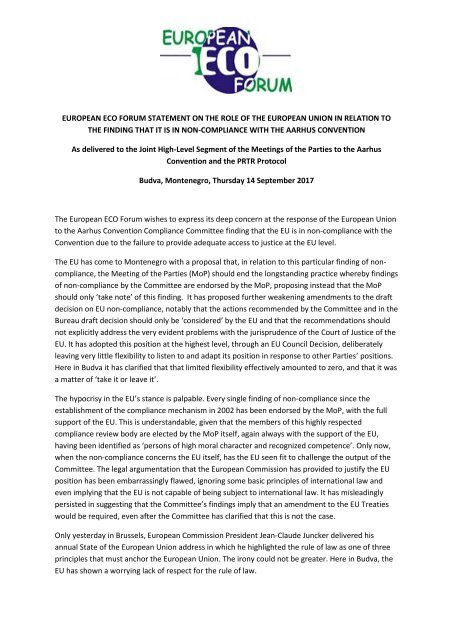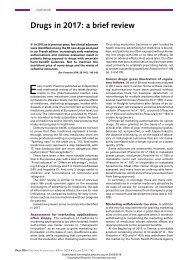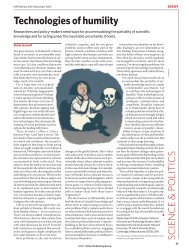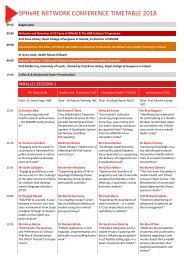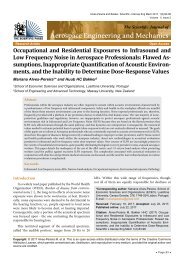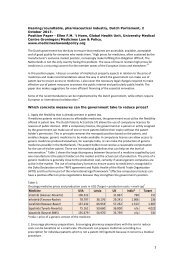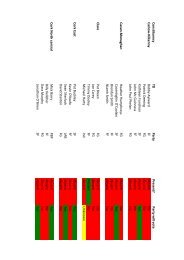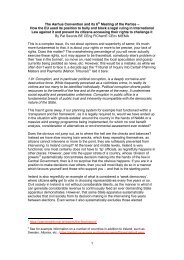European ECO Forum statement on EU non-compliance to Aarhus MoP 14 Sept
Create successful ePaper yourself
Turn your PDF publications into a flip-book with our unique Google optimized e-Paper software.
<strong>EU</strong>ROPEAN <str<strong>on</strong>g>ECO</str<strong>on</strong>g> FORUM STATEMENT ON THE ROLE OF THE <strong>EU</strong>ROPEAN UNION IN RELATION TO<br />
THE FINDING THAT IT IS IN NON-COMPLIANCE WITH THE AARHUS CONVENTION<br />
As delivered <strong>to</strong> the Joint High-Level Segment of the Meetings of the Parties <strong>to</strong> the <strong>Aarhus</strong><br />
C<strong>on</strong>venti<strong>on</strong> and the PRTR Pro<strong>to</strong>col<br />
Budva, M<strong>on</strong>tenegro, Thursday <strong>14</strong> <strong>Sept</strong>ember 2017<br />
The <str<strong>on</strong>g>European</str<strong>on</strong>g> <str<strong>on</strong>g>ECO</str<strong>on</strong>g> <str<strong>on</strong>g>Forum</str<strong>on</strong>g> wishes <strong>to</strong> express its deep c<strong>on</strong>cern at the resp<strong>on</strong>se of the <str<strong>on</strong>g>European</str<strong>on</strong>g> Uni<strong>on</strong><br />
<strong>to</strong> the <strong>Aarhus</strong> C<strong>on</strong>venti<strong>on</strong> Compliance Committee finding that the <strong>EU</strong> is in n<strong>on</strong>-<strong>compliance</strong> with the<br />
C<strong>on</strong>venti<strong>on</strong> due <strong>to</strong> the failure <strong>to</strong> provide adequate access <strong>to</strong> justice at the <strong>EU</strong> level.<br />
The <strong>EU</strong> has come <strong>to</strong> M<strong>on</strong>tenegro with a proposal that, in relati<strong>on</strong> <strong>to</strong> this particular finding of n<strong>on</strong><strong>compliance</strong>,<br />
the Meeting of the Parties (<strong>MoP</strong>) should end the l<strong>on</strong>gstanding practice whereby findings<br />
of n<strong>on</strong>-<strong>compliance</strong> by the Committee are endorsed by the <strong>MoP</strong>, proposing instead that the <strong>MoP</strong><br />
should <strong>on</strong>ly ‘take note’ of this finding. It has proposed further weakening amendments <strong>to</strong> the draft<br />
decisi<strong>on</strong> <strong>on</strong> <strong>EU</strong> n<strong>on</strong>-<strong>compliance</strong>, notably that the acti<strong>on</strong>s recommended by the Committee and in the<br />
Bureau draft decisi<strong>on</strong> should <strong>on</strong>ly be ‘c<strong>on</strong>sidered’ by the <strong>EU</strong> and that the recommendati<strong>on</strong>s should<br />
not explicitly address the very evident problems with the jurisprudence of the Court of Justice of the<br />
<strong>EU</strong>. It has adopted this positi<strong>on</strong> at the highest level, through an <strong>EU</strong> Council Decisi<strong>on</strong>, deliberately<br />
leaving very little flexibility <strong>to</strong> listen <strong>to</strong> and adapt its positi<strong>on</strong> in resp<strong>on</strong>se <strong>to</strong> other Parties’ positi<strong>on</strong>s.<br />
Here in Budva it has clarified that that limited flexibility effectively amounted <strong>to</strong> zero, and that it was<br />
a matter of ‘take it or leave it’.<br />
The hypocrisy in the <strong>EU</strong>’s stance is palpable. Every single finding of n<strong>on</strong>-<strong>compliance</strong> since the<br />
establishment of the <strong>compliance</strong> mechanism in 2002 has been endorsed by the <strong>MoP</strong>, with the full<br />
support of the <strong>EU</strong>. This is understandable, given that the members of this highly respected<br />
<strong>compliance</strong> review body are elected by the <strong>MoP</strong> itself, again always with the support of the <strong>EU</strong>,<br />
having been identified as ‘pers<strong>on</strong>s of high moral character and recognized competence’. Only now,<br />
when the n<strong>on</strong>-<strong>compliance</strong> c<strong>on</strong>cerns the <strong>EU</strong> itself, has the <strong>EU</strong> seen fit <strong>to</strong> challenge the output of the<br />
Committee. The legal argumentati<strong>on</strong> that the <str<strong>on</strong>g>European</str<strong>on</strong>g> Commissi<strong>on</strong> has provided <strong>to</strong> justify the <strong>EU</strong><br />
positi<strong>on</strong> has been embarrassingly flawed, ignoring some basic principles of internati<strong>on</strong>al law and<br />
even implying that the <strong>EU</strong> is not capable of being subject <strong>to</strong> internati<strong>on</strong>al law. It has misleadingly<br />
persisted in suggesting that the Committee’s findings imply that an amendment <strong>to</strong> the <strong>EU</strong> Treaties<br />
would be required, even after the Committee has clarified that this is not the case.<br />
Only yesterday in Brussels, <str<strong>on</strong>g>European</str<strong>on</strong>g> Commissi<strong>on</strong> President Jean-Claude Juncker delivered his<br />
annual State of the <str<strong>on</strong>g>European</str<strong>on</strong>g> Uni<strong>on</strong> address in which he highlighted the rule of law as <strong>on</strong>e of three<br />
principles that must anchor the <str<strong>on</strong>g>European</str<strong>on</strong>g> Uni<strong>on</strong>. The ir<strong>on</strong>y could not be greater. Here in Budva, the<br />
<strong>EU</strong> has shown a worrying lack of respect for the rule of law.
We welcome the fact that the other Parties <strong>to</strong> the C<strong>on</strong>venti<strong>on</strong> have opted for the ‘leave it’ opti<strong>on</strong>.<br />
While it is regrettable that further c<strong>on</strong>siderati<strong>on</strong> of this matter by the <strong>MoP</strong> will need <strong>to</strong> wait four<br />
more years, which sets a bad precedent, an even worse precedent would have been set by<br />
acceptance of the <strong>EU</strong> proposal. This could have seriously and permanently weakened the<br />
<strong>compliance</strong> mechanism and thereby the C<strong>on</strong>venti<strong>on</strong> itself, with detrimental effects across the regi<strong>on</strong><br />
that fly in the face of the <strong>EU</strong>’s claim <strong>to</strong> be a champi<strong>on</strong> of democracy. Furthermore, by all Parties<br />
agreeing <strong>to</strong> strive for c<strong>on</strong>sensus and refrain (the <strong>EU</strong> in particular) from resorting <strong>to</strong> a vote, the UN<br />
spirit of cooperati<strong>on</strong> was maintained. The integrity of the <strong>compliance</strong> mechanism has been, at least<br />
for now, preserved. And with or without a <strong>MoP</strong> decisi<strong>on</strong>, the finding of the Committee that the <strong>EU</strong> is<br />
in n<strong>on</strong>-<strong>compliance</strong> stands intact for all the world <strong>to</strong> see.<br />
While this has been a bad week for the C<strong>on</strong>venti<strong>on</strong>, it has been a humiliating week for the <strong>EU</strong>. Not a<br />
single other Party or stakeholder has spoken in support of the <strong>EU</strong> positi<strong>on</strong>, despite the <strong>EU</strong>’s<br />
c<strong>on</strong>siderable political and ec<strong>on</strong>omic influence in the regi<strong>on</strong>, and most if not all of those that have<br />
spoken have opposed it.<br />
The role of the <str<strong>on</strong>g>European</str<strong>on</strong>g> Commissi<strong>on</strong> has been particularly regrettable, having originally proposed<br />
outright rejecti<strong>on</strong> of the finding of n<strong>on</strong>-<strong>compliance</strong> in an apparent attempt <strong>to</strong> resist public<br />
accountability and deny NGOs the possibility <strong>to</strong> challenge its decisi<strong>on</strong>s before the courts – the same<br />
possibilities that it acknowledges should exist at Member State level.<br />
We recognise that the outcome could have been even worse, e.g. if the Commissi<strong>on</strong>’s original<br />
proposal <strong>to</strong> reject the findings had been adopted or if the <strong>EU</strong> had attempted <strong>to</strong> force through its<br />
positi<strong>on</strong> through insisting <strong>on</strong> a vote. And we applaud those Parties and entities within the <strong>EU</strong> whose<br />
efforts prevented those even worse outcomes, even if due <strong>to</strong> the n<strong>on</strong>-transparent nature of the <strong>EU</strong>’s<br />
internal decisi<strong>on</strong>-making processes we cannot know which they are and are unable <strong>to</strong> thank them<br />
directly.<br />
This debacle has put the spotlight <strong>on</strong> the <strong>EU</strong>’s internal decisi<strong>on</strong>-making processes. It is noteworthy<br />
that the <strong>EU</strong> Member States are the <strong>on</strong>ly Parties <strong>to</strong> the C<strong>on</strong>venti<strong>on</strong> whose individual positi<strong>on</strong>s during<br />
<strong>MoP</strong> negotiati<strong>on</strong>s are not public. The fact that the <strong>EU</strong>’s internal decisi<strong>on</strong>-making processes mean<br />
that in theory <strong>on</strong>ly a few <strong>EU</strong> Member States with Commissi<strong>on</strong> can effectively determine the positi<strong>on</strong><br />
of the entire <strong>EU</strong>, which represents a majority of the Parties, tends <strong>to</strong> undermine the democratic<br />
decisi<strong>on</strong>-making processes within the C<strong>on</strong>venti<strong>on</strong> bodies.<br />
We now call <strong>on</strong> the <strong>EU</strong> <strong>to</strong> listen <strong>to</strong> the feedback it has got from Budva and <strong>to</strong> swiftly take the<br />
measures needed <strong>to</strong> bring the <strong>EU</strong> back in<strong>to</strong> <strong>compliance</strong>. Most obviously, it should initiate without<br />
delay the process of revising the <strong>Aarhus</strong> Regulati<strong>on</strong> which up <strong>to</strong> now, in combinati<strong>on</strong> with the<br />
jurisprudence of the Court of Justice of the <strong>EU</strong>, has effectively prevented NGOs from seeking access<br />
<strong>to</strong> justice in defence of the envir<strong>on</strong>ment at the <strong>EU</strong> level in all but access <strong>to</strong> documents cases. Only if<br />
it does so will it avoid a further humiliati<strong>on</strong> when the <strong>MoP</strong> rec<strong>on</strong>venes in 2021.<br />
************


